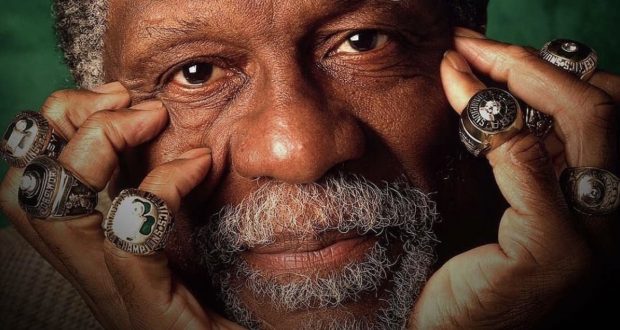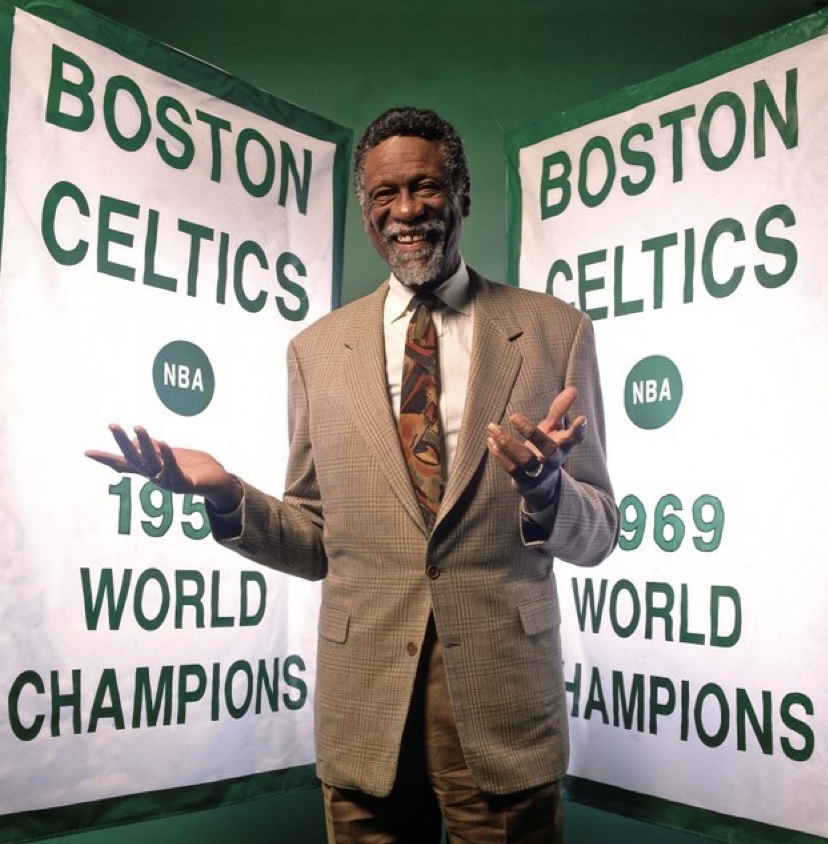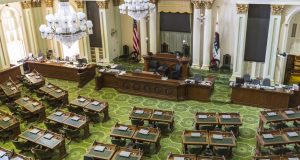By Cynthia Ellis
Basketball and civil rights legend Bill Russell has passed at 88 years old. He redefined how basketball is played and changed how sports are viewed in a racially divided country.
William Shelton Russell was born on February 12, 1934, in Monroe, Louisiana, where his father, Charles, worked in a paper bag factory.
His childhood and seared by racism. His mother, Katie, was nearly arrested and threatened by a police officer because her stylish white outfit “looked like something a white woman would wear.”
As a young boy, he witnessed his father growing weary of the Jim Crow-era laws that allowed White people to be served first at a gas station. When his father tried to leave to find another gas station, the owner put a shotgun to his face and told him to wait his turn.
When Bill was nine years old, the family moved to Oakland, CA, and his mother died when he was twelve. His father opened a trucking business and then worked in a foundry to raise Bill and his brother, Charles Jr.
Later in life, the man, the athlete, stood tall. He was dangerous. He was “woke,” daring anyone to challenge his consciousness, his boots-on-the-ground stripes, or his authenticity.
Russell will always be remembered as one of the most impactful athletes in American history. His accolades include:
- 2X NCAA Champ
- 11X NBA Champ (2 as coach) of the Boston Celtics
- Olympic gold medalist
- The 1st Black head coach of any North American pro sports team
- *Received Presidential Medal of Freedom in 2011
From All American to the NBA…
At McClymonds High School in Oakland, Russell became a senior starter on the basketball team, already emphasizing defense and rebounding.
A former University of San Francisco basketball player, Hal DeJulio, who scouted for his alma mater, recognized his potential and recommended him to coach Phil Woolpert. Russell was given a scholarship and became an All-American, leading San Francisco to NCAA championships in his last two seasons. He was the NCAA Tournament Most Outstanding Player in 1955 and the U.P.I. Player of the Year in 1956.
“No one had ever played basketball the way I played it, or as well,” Russell told Sport magazine in 1963, recalling his college career. “They had never seen anyone block shots before. So now I’ll be conceited: I like to think I originated a whole new style of play.”
During the 1956 N.B.A. draft, the Harlem Globetrotters were reportedly willing to offer Russell a lucrative deal. However, he refused to sign with them and found the prospect of yearlong worldwide traveling unappealing.
“Their specialty is clowning, and I had no intention of being billed as the funny guy in a basketball uniform,” Russell was quoted to say.
Russell led the United States Olympic Team to a gold medal in the 1956 Melbourne Games and joined the Boston Celtics. Playing in 48 games as a rookie, he averaged 19.6 points and helped the team win its first N.B.A. title, defeating the St. Louis Hawks in the finals.
Player and Protester…
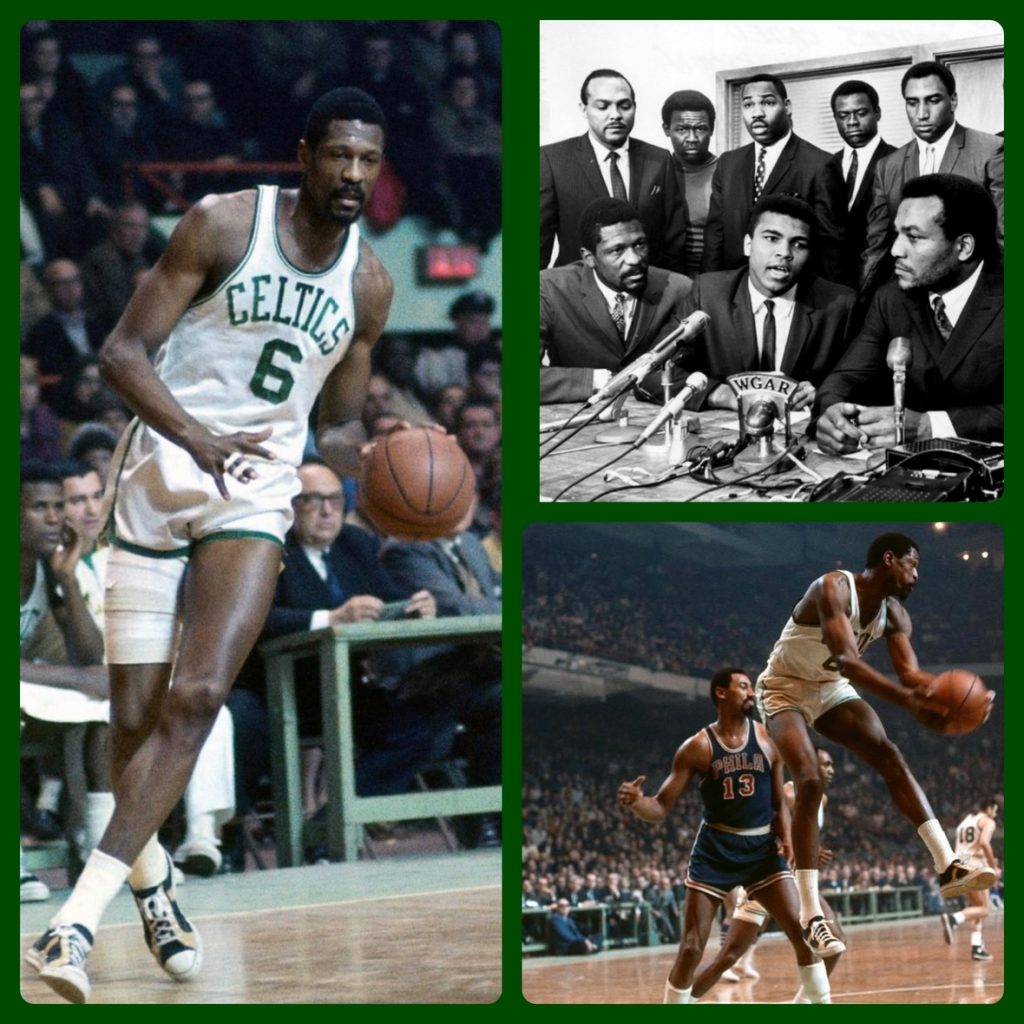
Bill Russell playing with the Boston Celtics and at the Cleveland Summit in 1967 with Muhammad Ali and Jim Brown
Russell joined the Boston Celtics in 1956, just two years after the Supreme Court’s Brown v. Board of Education decision declared the unconstitutional notion of “separate but equal” schooling. As one of the few Black players on the Celtics, Russell experienced a unique kind of trauma.
He endured the “city-hall-crony-racist, brick throwing racist, and send them back to Africa racist.But as he became one of the country’s most visible athletes in the civil rights realm, he charged the predominately White NBA in the late 1950s with purposely excluding Black players. In 1961, after two black Boston Celtics players were denied service at a Lexington, Kentucky, coffee shop before a preseason exposition game, Russell led a boycott in which he and other Black players refused to play in the state. In 1964, he led a faction of players at the All-Star Game who threatened not to play unless NBA owners formally recognized the players union and granted them a pension plan.
On court, Russell was subjected to racist taunts and slurs. During games, people yelled hateful, indecent things: “Go back to Africa,” “Baboon,” “Coon,” and “Nigger.” In the town of Reading outside Boston, where he resided, Russell and his family endured threats, break-ins, and vandalism.
But Russell was present time and time again at key moments of the Civil Rights Movement. He was at the March on Washington in 1963 when Dr. Martin Luther King, Jr. gave his “I Have a Dream” speech. He visited Mississippi following the assassination of civil rights leader Medgar Evers. He also supported Muhammad Ali when he refused to be drafted into the Vietnam War.
The NBA’s First African American Head Coach…
Russell broke ground in 1966 when he became the NBA’s first Black head coach, all while still jumping center for Boston. He helped the Celtics become one of the most successful franchises in the league.
The team’s successes eventually helped win over the Boston fans, but the relationship was beyond repair. Russell said he “played for the Celtics” but “not the city of Boston,” according to his daughter Karen, who movingly wrote about the family’s encounters with racism in an essay for the New York Times.
Medal of Freedom…
In 2011, President Barack Obama awarded Russell the Medal of Freedom Award alongside Congressman John Lewis, billionaire investor Warren Buffett, then-German Chancellor Angela Merkel, and baseball great Stan Musial.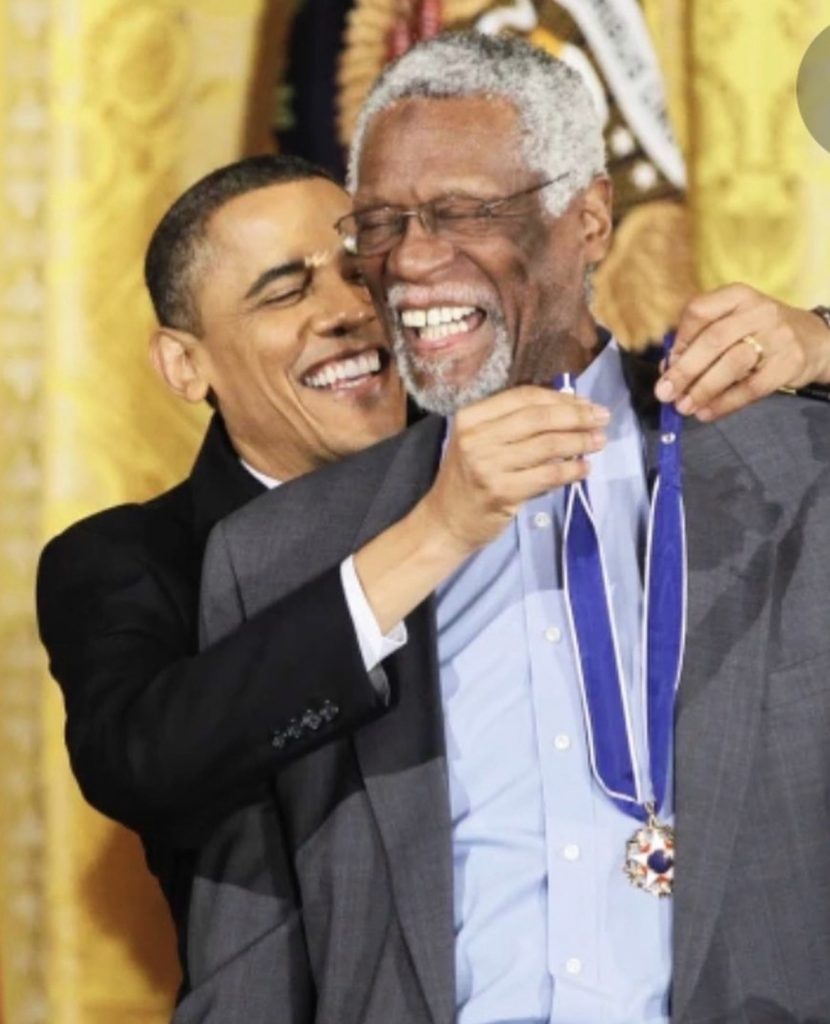
At the ceremony, Obama said: “Bill Russell, the man, is someone who stood up for the rights and dignity of all men. He marched with King and stood by Ali. he endured insults and vandalism but kept focusing on making the teammates he loved better players and made possible the success of so many who would follow.”
Celebrating Bill Russell’s Legacy…
Bill Russell was my hero and role model, not because of the 11 out of 13 years as an NBA champion. It was because of what he stood for in fighting for justice, equality, and civil rights. Bill Russell paved the way for me and others in making a difference in my life. I followed his journey; he was born in Louisiana, attended McClymonds High School in West Oakland, CA, and attended the University of San Francisco. Boston Celtics, you will be missed but not forgotten. Rest in Heaven — Sonny Parker (former NBA player, Golden State Warriors)
William Felton Russell, nicknamed Bill, was the first basketball player I watched play this great game in 1965. I was around 9 or 10 years old, and his speed and determination made me want to stop playing baseball outdoors every day and made us want to trade my baseball mitt in for a basketball. Bill, with his goatee, reminded me of the older intelligent brothers from my southside neighborhood.
Bill Russell was a winner in high school, college, and the pros. He was a team player, and it showed on and off the court. He marched in the civil rights movement and Dr. King.
I met Bill Russell at St. Sabina’s Church during the 1988 NBA All-Star weekend in Chicago. When I shook his hand, I told him how he had impacted me to play high school and college basketball and the goal of achieving my college degree. Bill laughed, he hugged me and gave me an autograph. I felt as though I had met “Mr. Black History” himself. – Alan Hunt (former player, SIU Edwardsville)
Bill Russell was a legendary player and coach, an even better person. He approached everything he did with determination, principle, and wisdom. I will always be grateful for the chance to call him my friend. – President Bill Clinton
Bill Russell, the icon, the idol, the champion. As a young black child growing up in Chicago in the 60s and playing sports, Bill Russell was always one of my idols because he constantly displayed a winning attitude. Although he spent his basketball career in Boston (one of the most prejudiced and racist cities in America at the time), his attitude and professionalism for being a constant champion never wavered as he led the franchise to 11 NBA championships in 13 years. I was amazed by his accomplishments, and it showed young black kids like me that success in basketball was possible and any limitations you faced were only the ones you put on yourself. Bill’s persona showed us that no matter what he faced, just be who you are and be the best at what you do, and you can make a difference in society using your sports platform.
Bill Russell, Wilt Chamberlain, Connie Hawkins, and other individuals like them were my idols. They were men that I wanted to be like. They stood up for what they believed in. They were helping change the world and not just basketball, regardless of the consequences they faced.
I have memories of Bill Russell sitting next to Muhammad Ali at the Cleveland Summit which also included Jim Brown, Kareem Abdul-Jabbar (formerly Lew Alcindor), and many other iconic sports figures from the black community who were standing with Ali against the war in Vietnam.
It wasn’t until 2003 that I met this man I revered as one of my idols while coaching at Marquette University. Our head coach, Tom Crean, had Bill Russell come on campus to address our players and coaching staff. He spent the day with us talking about his life experiences on and off the court. He shared with us how to use our sports platform to make a difference in life. I listened diligently as he spoke, and after he was done, it was clear to me the importance of helping our next generation of young people by sharing my life stories with them. This was a very memorable time in my life. It was clear that he had made an impact on me, and I knew it.
Bill Russell was truly an icon, he was a champion, he was my idol, who stood for more than just basketball. He was truly an amazing individual. – Bo Ellis (former Marquette Warriors Championship, former NBA Denver Nuggets)
Trailblazer. Icon. Greatest Champ in basketball. Made the world on and off the court a better place. Thank you, and rest easy! – Stephen Curry, Golden State Warriors
The image, the voice, the dignity, the leadership, the values, the integrity, the intestinal fortitude, the credibility, and the winner. These are just a few characteristics that describe Bill Russell to me. As I absorbed this Black man on TV, he gave me a sense of pride. It created an insatiable desire to know more about him and where he came from. This was about the same time I was learning and falling in love with the game of basketball. My seventh-grade basketball coach loved the Boston Celtics and Bill Russell in particular. He told us the Boston Celtics won because their best player didn’t care who scored the most points, only that they played as a team.
I became even more curious about him when I learned that his life was marred by racism and bigotry and was the impetus for him taking a stance and not becoming an idle victim. His mom and dad were forced to move to the projects after facing this nefarious behavior. In college, he and his teammates were denied hotel rooms because of the color of their skin in North Carolina and Kentucky. His disdain for White people was expressed on several occasions when he said, “I dislike most White people because they are people, I like most Black people because I’m Black. This was after his house in Massachusetts was burglarized, with epithets written on the walls and feces placed in his bed.
Bill Russell was an unbelievable winner, with two high school championships, a collegiate Championship, an Olympic Gold Medal winner, and 11 NBA Championships in 13 years, two as the Head Coach. In my opinion, he’s the greatest winner of all time, period. With all that winning, he was a better man and an advocate for his Black people, i.e., Cleveland Summit, Black Power Movement, and Black Causes. Bill, you will be missed on every level. – Dr. Lloyd Walton (former NBA player Milwaukee Bucks)
 Westside Story Newspaper – Online The News of The Empire – Sharing the Quest for Excellence
Westside Story Newspaper – Online The News of The Empire – Sharing the Quest for Excellence
